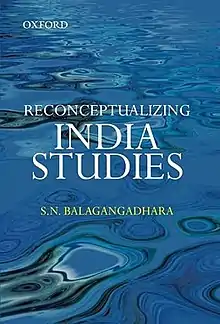Reconceptualizing India Studies
Reconceptualizing India Studies, by S. N. Balagangadhara, is a book published in 2012 about the problems that the postcolonial studies, India studies and Indology are facing today, and the possible new directions for rejuvenating them. The emergence of the postcolonial scholarship had ingested a new life in the quest of the 'third world countries' to produce knowledge about themselves. However, over the years, postcolonial scholarship has become obsolete and is in need of a rejuvenation and rethought. This book is a stronger voice in the recent attempts to do this. This book avers that the post-colonial studies about India is, perhaps, unknowingly, promoting "the same old colonial ideas it had set out to debunk, lacking an original framework to study India from the Indian perspective the current model borrows the Oriental/colonial framework, thereby constraining the social science studies in India. The author of the book, S.N. Balagangadhara, here "urges his fellow-intellectuals from India to stop ‘mimicking’ western descriptions of India and to provide descriptions of themselves and their society against the background of their own culture. Although his book is addressed to Indian intellectuals, it ... reminds [the western social scientists and philosophers] ... that the social sciences as these have developed until now, cannot lay a claim to the predicate ‘science’ if and in so far their research-objects cannot escape from the scope of secularized Christian discourse."[1]
 | |
| Author | S. N. Balagangadhara |
|---|---|
| Country | India, Europe |
| Language | English |
| Subject | India Studies, Social Sciences |
| Publisher | Oxford University Press |
Publication date | 2012 |
| Pages | 288 |
| ISBN | 978-0-19-808296-5 |
| Preceded by | '"The Heathen in his Blindness..." (1994) |
Reviews and Discussion
According to Prakash Shah of Department of Law, Queen Mary, University of London, this book is written in a very accessible way. However, one should not read this book before reading the authors' first major work, The Heathen in his Blindness... (1994). For, one will not understand the gravity of claims that this book makes. [2] Elsewhere, Shah writes, "the diatribes directed towards Indian culture are based on the ‘fact’ that they manifest Brahmanism and that it is Brahmin upper castes and their followers who perpetuate the backwardness of India. Such stories are retold by many Indian intellectuals also because they suffer from what S.N. Balagangadhara refers to as ‘colonial consciousness’."[3]
His co-author and former student, Jakob De Roover, notes that "if it weren't for political correctness, most social scientists would today explicitly agree with the old colonial assessment of Indians as immoral and superstitious. ... [The] scientific study of Indian culture ... [has] ended up reproducing descriptions of India that transform it into an inferior and backward culture." This book, De Roover says, "raises the question how this could happen?" The book comes as a wake-up call. If we keep travelling along the same route,"we shall continue to view other cultures as erring variants of the West. This is problematic not because all cultures are equal, but because this framework prevents us from learning from alternative forms of life."[4][5]
According to Harry van den Bouwhuijsen, "In Reconceptualizing India Studies, apart from briefly examining the possibility and preconditions for a Comparative Science of Cultures, hemainly urges his Indian fellow-intellectuals to provide the descriptions which are a conditio sine qua non for such a science to get off the ground."[6]
A writer of nationalist Flemish publications, Koenraad Elst, points out that in the "Reconceptualizing India Studies..., the attentive reader will see a critique of the Indological establishment in the West and the political and cultural establishment in India. ... [This work] questions their legitimacy. The reigning Indologists and India-watchers would do well to read it." [7]
As a reviewer pointed out, this "book is not written as the fruit of the genius of one important intellectual but rather as an invitation to think, to be part of a research programme, a project of enriching our life and culture. That this research programme is intended as a challenge to the current social scientific theories and practice is a way of saying that they (the current social sciences) are the major impediments in living a meaningful and dignified life as Indians.[8]
References
- The Lecture Cafés Team. "Asia and the challenges for the social sciences and humanities". Lecture Cafés. Retrieved 14 May 2013.
- GLOCUL, Centre for Culture and Law, School of Law, Queen Mary, University of London
- http://aryalegal.wordpress.com/2013/04/09/caste-discrimination-reflection-needed-not-legislation/
- De Roover, Jakob. "Reconceptualizing India Studies Lecture at the book release in Brussels". Retrieved 2 May 2013.
- http://www.flw.ugent.be/agenda/220
- Bouwhuijsen, Harry van den. "Conversation of mankind or Comparative Science of Cultures? Reading Balagangadhara, Reconceptualising India Studies". Paper presented May 28, 2013 for the India Platform, Ghent. Retrieved 30 March 2014.
- Elst, Koenraad. "The lost honour of India studies". Retrieved 8 May 2013.
- Jalki, Dunkin (2012-11-27). "Decolonising the social sciences". The Hindu. Retrieved 2013-01-09.
External links
- Reconceptualizing India Studies, Oxford University Press